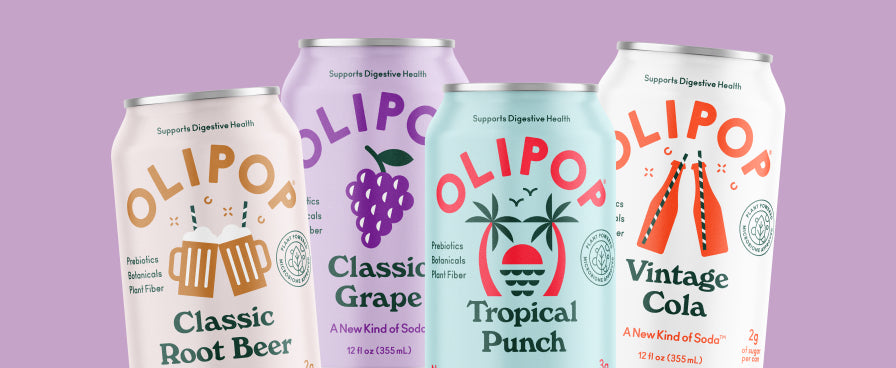Prebiotics are non-digestible fibers that the beneficial bacteria in your gut need to survive. As a major food source for those good-for-you bacteria, prebiotics play an important role in keeping you healthy. Adding more prebiotics to your diet is a great way to support your overall health. But, unfortunately, they don’t get the spotlight that they deserve!
In this blog, we're highlighting the all-important benefits of prebiotic fiber and how to add more to your diet.
What is Prebiotic Fiber?
Prebiotic fiber is a type of fiber that is not digested by the body and helps feed the beneficial bacteria in your gut. It's a superhero for gut health, helping support digestion, nutrient absorption, satiety, immune health, and more. All prebiotics are fiber, but not all fiber is prebiotic.
Here’s what we mean when we say “not digested.”... When you chow down on food, your digestive system gets to work breaking down that food into smaller parts. Protein to amino acids, complex carbohydrates to simple sugars like glucose, and fats into fatty acids. But that doesn’t happen with fiber.
Fiber is a "non-digestible" carbohydrate because it's not broken down during the digestive process. Because your body can’t break down fiber, that fiber passes through your digestive system until it makes its way into your large intestine. It's here that prebiotic fiber becomes the food source of the live and active bacteria living in your gut microbiome.
Prebiotic Fiber Foods
Speaking of food sources, you might be wondering: what foods contain prebiotic fiber? To help you load up on prebiotic fiber, here are some of the highest all-natural sources of this key fiber:
- Asparagus
- Apples
- A slightly underripe banana
- Barley
- Cassava root
- Chickpeas
- Chicory root
- Fennel
- Garlic
- Jerusalem artichoke
- Onions
- Oats
A diet rich in a variety of fruits, vegetables, and other plants will help ensure you're taking in enough prebiotic fiber to help keep you (and your gut!) healthy. OLIPOP can also help with this! As a high fiber beverage with prebiotics, we can help supplement your diet with a little extra fiber.
If you're concerned you're not getting enough, you can also add prebiotic fiber to food products or take them as a dietary supplement. But, if you're considering supplements, look for products that are third-party verified. Supplements are not regulated by the Food and Drug Administration (FDA) in the United States in the same way that food is. Third-party verification helps ensure you're getting the highest quality. Also, make sure that you're taking pills that aren't expired or stored in hot environments.
Probiotics vs. Prebiotics
You may be thinking, “wait, aren’t they called probiotics?” Nope! While they sound similar, prebiotics and probiotics are different. (Although both play a role in supporting digestive health.)
Probiotics are live organisms, like bacteria, that live in your body. These “good” bacteria line the inside of your gut and offer a host of beneficial roles in your body. And just like all living things, probiotics need fuel to survive. And that's where prebiotic fiber comes in. Essentially, prebiotics act as “food” for probiotics.
Health Benefits of Prebiotic Fiber
Feeding these good-for-you bacteria with prebiotic fiber is one of the best ways to support a healthy microbiome. And that's because the break-down of prebiotic fiber in your gut produces several health-supporting compounds, like short-chain fatty acids (SCFA). SCFAs can benefit your health by strengthening the gut barrier, balancing blood sugar, supporting the immune system, and promoting a healthy digestive system. [1]
Here are some of the potential benefits of prebiotic fiber:
- Increases beneficial bacteria species: They increase the amount of certain beneficial bacteria species in the gut (namely, bifidobacteria and lactobacilli, bacteria that help support our immune and gut health). [2]
- Supports calcium absorption: Data shows that prebiotics can positively change the gut microbiota make-up, produce short-chain fatty acids, and decrease intestinal pH (making it more acidic). These are all factors that help support bone health and aid in calcium absorption. [3]
- Decreases harmful bacteria: Prebiotic fiber selectively “feeds” helpful bacteria. This helps lower the pH in your gut, making it more acidic. Since many harmful bacteria, like e. Coli, can’t live in an environment with a super-low pH, taking in enough prebiotics can help keep the harmful bacteria at bay. [4]
Other Names for Prebiotic Fiber
If you're looking for prebiotic fiber on the label of your favorite foods or drinks, you may come up empty-handed. Prebiotics is not a term you'll often find on the back label of foods. But there are other names you may find instead. These include:
- Inulin
- Fructooligosaccharides (FOS)
- Galactooligosaccharides (GOS)
Consuming foods with these ingredients, such as chicory root and Jerusalem artichoke, will help you on your quest to eat more of this fiber.

Possible Side Effects of Prebiotic Fiber
Adding prebiotic fiber to your diet comes with very little risk and shouldn't cause any long-term harm to most people. But, of course, there are always exceptions to the rule.
If you're not used to consuming high-fiber foods, your gut may need some time to adjust if you start increasing your prebiotic fiber intake. Some people may feel bloated and gassy and may experience abdominal pain after they consume prebiotic-rich food. These symptoms should go away once the body gets used to the changes in your gut.
If you have a diagnosed gastrointestinal disorder (like IBS), it's best to take prebiotics under the supervision of your health care provider.
Prebiotic Fiber in OLIPOP
Many sodas are void of nutritional value. Combining food coloring with high fructose corn syrup and carbonated water results in a very sweet drink loaded with sugars and not much else.
OLIPOP stands out with its unique, research-backed ingredients to support your digestive health. Our sodas are high in fiber, featuring ingredients like chicory root, Jerusalem artichoke, and cassava root fiber, along with other components that support digestive health and a healthy microbiome.
Having a soda that contains prebiotic fiber is one simple and convenient way to support your gut health in a delicious and functional way. Drinking a can of OLIPOP will not only satisfy your sweet tooth, but it will also give your body a boost of fiber to support your overall health.
Sources
- Team, GMFH Editing. “Short-Chain Fatty Acids.” Gut Microbiota for Health, July 14, 2016. https://www.gutmicrobiotaforhealth.com/short-chain-fatty-acids/.
- Sarao LK, Arora M. “Probiotics, prebiotics, and microencapsulation: A review”. Crit Rev Food Sci Nutr. Vol. 57, no. 2, 2017, pp. 344-371. doi: 10.1080/10408398.2014.887055
- Liu Y, Zhao Y, Yang Y, Wang Z. “Effects of Probiotics, Prebiotics, and Synbiotics on Calcium Homeostasis and Bone Health With Aging: A Systematic Review.” Worldviews Evid Based Nurs. Vol 16, no. 6, 2019, pp. 478-484. doi: 10.1111/wvn.12405
- Holscher HD. “Dietary fiber and prebiotics and the gastrointestinal microbiota.” Gut Microbes. Vol. 8, no 2, 2017, pp: 172-184. doi: 10.1080/19490976.2017.1290756.
- “Probiotics,” International Scientific Association for Probiotics and Prebiotics (ISAPP), accessed June 4, 2021, https://isappscience.org/for-scientists/resources/probiotics/.
- Brosseau C, Selle A, Palmer DJ, Prescott SL, Barbarot S, Bodinier M. “Prebiotics: Mechanisms and Preventive Effects in Allergy.” Nutrients. Vol 11, no. 8, 2019, pp 1841. doi: 10.3390/nu11081841.
- Prebiotics are non-digestible fibers that the beneficial bacteria in your gut need to survive. They play an important role in keeping you healthy.
- Prebiotic Fiber has many health benefits such as supporting the growth of beneficial bacteria, supporting calcium absorption, and decreasing levels of harmful bacteria in the gut.
















